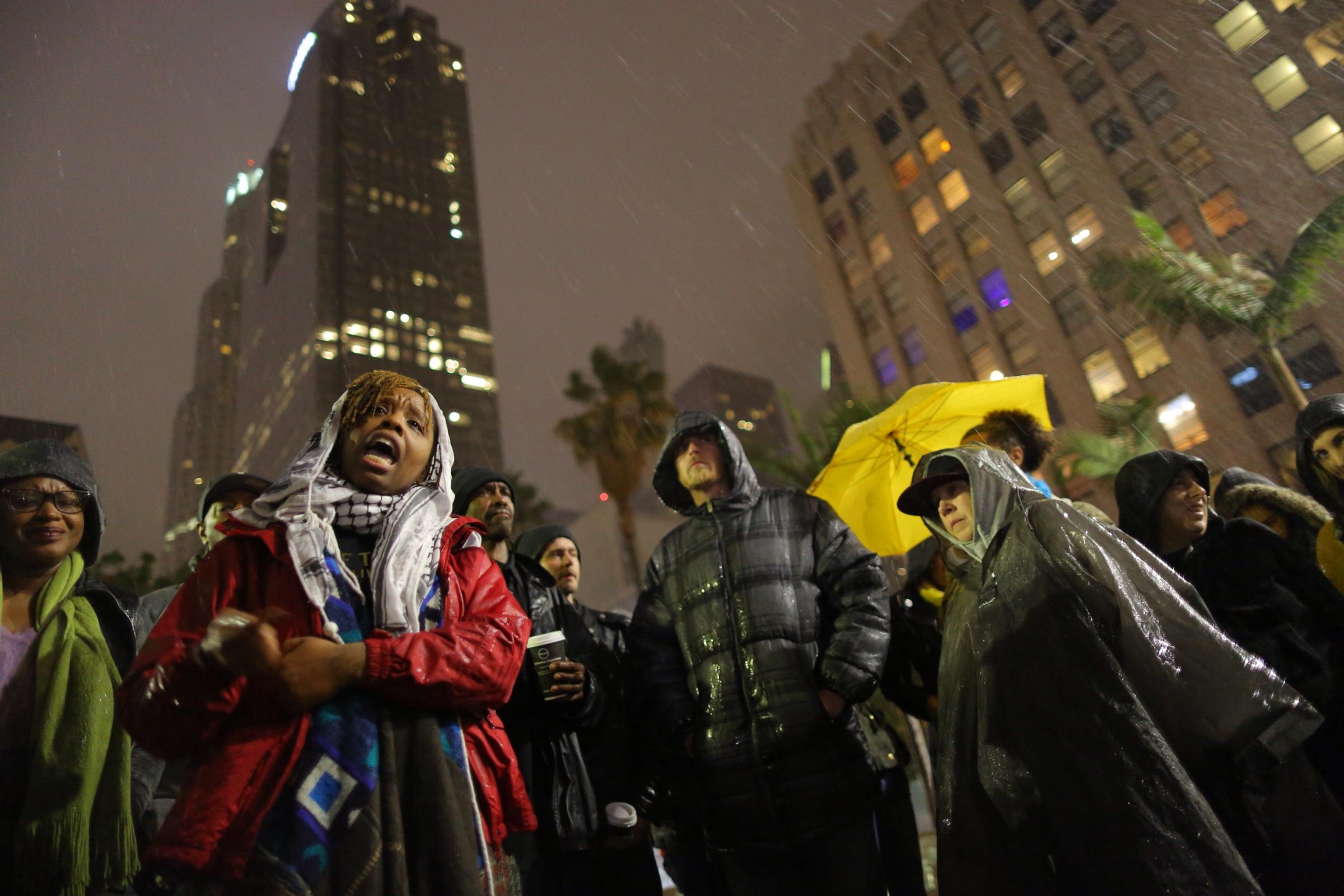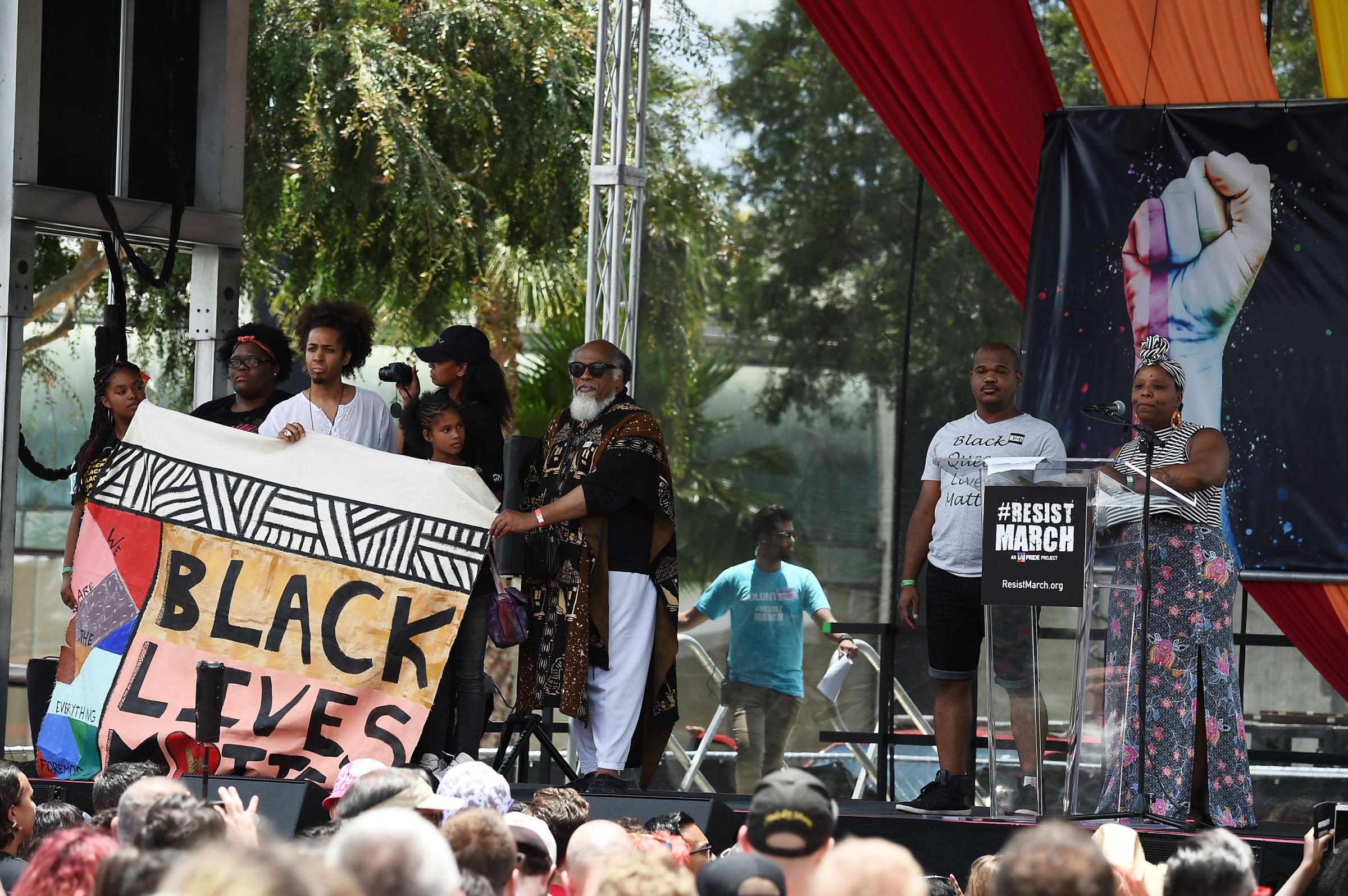Patrisse Cullors is many things, but she is definitely not a terrorist. She is a catalyst. She is a crusader. And she helped found Black Lives Matter. Cullors, 34, recently published a memoir titled When They Call You a Terrorist. It’s a work in halves: “All the Bones We Could Find,” which recounts her adolescence, and “Black Lives Matter,” which demonstrates how tragic incidents of her youth propelled her to create one of the most influential — and polarizing — social justice groups today.
The movement took shape in the wake of the 2013 killing of Trayvon Martin, but for Cullors, its roots are centuries deep in American history, and a lifetime within herself. Cullors first wrote the #BlackLivesMatter hashtag in a comment on a Facebook status of co-founder Alicia Garza, who was lamenting the acquittal of Martin’s killer, George Zimmerman. Since then, the movement — with the help of its third co-founder, Opal Tometi — has become a national coalition for protesting violence and systemic racism against black people. As Cullors tells TIME, “This call, this need and this desire for a Black Lives Matter started when I was much younger.”
Cullors was nine when she saw her 11- and 13-year-old brothers needlessly slammed into a wall by police. She grew up in Los Angeles in the 1990s, raised by a single mother in Section 8 housing, along with her sister and two brothers — one of whom would later be diagnosed with schizoaffective disorder. His mental illness resulted in multiple trips to prison, where he was beaten and forced to drink toilet water, Cullors says.
And then there was her father — not the mostly absent but loving man she grew up believing was her dad, but her biological father, whose identity her mother revealed when Cullors was 12. He also served several stints in prison, both before and after he came into Cullors’ life. His offenses were related to crack possession — i.e. substance abuse and addiction. Jail, Cullors and co-author Asha Bandele write, “is how our society responded to his drug use.” “I think we have a crisis of divesting from poor communities, black communities in particular, and reinvesting into these communities with police, jails, courts, prisons,” Cullors says.
When They Call You a Terrorist deals with the incarceration and disenfranchisement of black men like her father, but it also explores facets of Cullors’ personal identity — black womanhood and sexuality, as well as spirituality. Cullors identifies as a Queer person who is mostly interested in other Queer people, though she has had multiple heterosexual relationships. She muses on her experience as a Jehovah’s Witness who remained committed to the faith for years, even in exile. (Jehovah’s Witnesses disfellowships members who are judged to have committed a serious sin, which meant that Patrisse’s mother as well as her children were shunned from the religion and other family members after she got pregnant with Patrisse’s oldest brother as a teenager.) Cullors weaves her intellectual influences into this narrative, from black feminist writers like Audre Lorde and bell hooks, to Karl Marx, Vladimir Lenin and Mao Zedong. Reading those social philosophers “provided a new understanding around what our economies could look like,” she says. Reading Lorde and hooks “helped me understand my identity.”

Through these dimensions of Cullors’ life, an intimate portrait of Black Lives Matter emerges. It is one of black women building political power for marginalized people beyond themselves. The organization embraces all genders and sexualities, and criticizes contemporary capitalist society for the way it disenfranchises people of color, particularly black women. According to a 2017 report from the Institute for Women’s Policy Research and the National Domestic Workers Alliance, black women experience poverty at higher rates than black men and women from all other ethnic groups except Native American women. The same report found that black women, despite lacking representation at “every level of federal and state political office in the United States,” have voted more than any other group of men or women during the last two presidential elections.
“Black women are building the power of some of the most marginalized,” Cullors says. “Black women are centering people — not just themselves — that are being attacked by a right-wing government that we’re living underneath right now.”
That notion was brought to bear several times recently. Polls show that black women overwhelmingly voted against Donald Trump, with 94% supporting Hillary Clinton, in contrast to 53% of white women who voted for the current president. In December, black women were hailed as saviors for voting against Alabama Senate hopeful Roy Moore who, despite facing allegations of pedophilia and sexual misconduct, nearly won the state’s vacated seat in a special election. Karen Attiah of the Washington Post wrote, “We mobilize our families, our churches and our friends to exercise our democratic rights.” The actor Mark Ruffalo at the time tweeted, “I said a prayer the other day and when God answered me back she was a Black Woman.” But for all the praise, a number of black women hit back at white liberals with contentions of opportunism. “[I]f you really want to thank us, how about you change the laws making it easier for us to vote, or sing our praises by giving us raises,” Daily Show correspondent Dulce Sloan said during conversation with host Trevor Noah.
Cullors urges Americans to recognize that black women are being strategic as well as socially generous. “Black women voted against Roy Moore not because they necessarily wanted the other guy, they voted against Roy Moore because they knew that would be better for the people of Alabama and to be frank, better for the rest of the country.”
Influence is part of the agenda of Black Lives Matter. Cullors says she wants the movement to affect political races both locally and on a national scale. She says that Black Lives Matter has its eye on a slew of high-profile Congress seats and governorships that will be contested in the midterm elections. She also highlights the importance of elections for district attorneys, “who in their power should be prosecuting killer cops, but are deciding not to or choosing not to.” In the gubernatorial races — there will be 36 this year — Cullors says the organization is specifically looking to Georgia, where Stacey Abrams and Stacey Evans, or as Cullors puts it, “the black Stacey and the white Stacey,” will square off in the Democratic primary.
“The black Stacey is amazing, brilliant, and actually could potentially run for president,” Cullors says of Abrams, the former House Minority Leader of the Georgia General Assembly, who could become the first African American female governor in the United States. “She has all the qualifications to run for governor,” notes Cullors. “So many people in the Black Lives Matter network, but also Movement for Black Lives, the larger organization for our movement, are looking at supporting Stacey’s campaign.”
And then there is the presidential election in 2020. Cullors says that it is a priority for Black Lives Matter organizers to stop Donald Trump from retaining the White House, and to “gain power back in our communities and in the country.”
“The unfortunate reality is the alt-right has captured white people’s imagination,” she adds. “We have to be able to capture the imagination of the American people.”

In recent days, a new group of protestors has captured the public’s attention: the students of a Parkland, Fla., high school who survived a shooting that left 17 of their classmates and teachers dead on Feb. 14. The students and their allies have received praise and donations for their efforts to change gun control policy, which includes a planned “March for Our Lives” in Washington, D.C. next month. But some have pointed out a disproportionate response. Author Roxane Gay tweeted that it was “interesting to note the difference in support” for those students compared to Black Lives Matter activists who protested after police killings in Ferguson and Baltimore.
Cullors agrees with the sentiment. “Young, white students have been able to be seen as victims — which they are — and heroes — which they also are — but we, instead of seeing us as victims and heroes, we were seen as a group of people that were aimless, that didn’t have a plan, that were too angry, [that] were not doing it right,” Cullors says. “So we can’t help but recognize the ways in which different racial groups are treated differently when they stand up for their lives.
“It’s unfortunate it had to take young people losing their lives again for them to be listened to, but I think now is that time,” Cullors adds. “And to be honest with you, we wouldn’t be seeing this level of protest if we didn’t have this for the last five years. Black Lives Matter really set this idea of how we fight and how we protest into action.”
The 13th chapter of When They Call You a Terrorist is aptly titled “A Call, A Response.” Here, Cullors outlines the first series of marches she, Garza and Tometi organized in the wake of Zimmerman’s acquittal. Following marches on New York City and Oakland, Cullors turned her attention to Los Angeles’ glitzy Beverly Hills neighborhood. It was the largest march she had planned at that point, and the first in a predominantly white and wealthy community. “I say that they, those who come for brunch, have to confront the police presence today but that this is our everyday,” Cullors and Bandele write.
Backed by students from California State University and local activists and armed with a megaphone, Cullors took to Rodeo Drive with helicopters hovering above. She asked restaurant diners and clothes shoppers to “just stop for a moment, to hold space for Trayvon Martin, to hold space for his parents left in grief and an unspeakable pain.” Police began to move in closer. Cullors was afraid they would attack.
But, she repeated her plea anyway. “And as far as I can tell, every single person within reach of my voice, and all of them white as far as I can see, puts down their champagne glass and their silver fork and stops checking their phone or having their conversation and then every last one of them bows their head.”
The chapter concludes: “We are a generation called to action.”
More Must-Reads from TIME
- Donald Trump Is TIME's 2024 Person of the Year
- Why We Chose Trump as Person of the Year
- Is Intermittent Fasting Good or Bad for You?
- The 100 Must-Read Books of 2024
- The 20 Best Christmas TV Episodes
- Column: If Optimism Feels Ridiculous Now, Try Hope
- The Future of Climate Action Is Trade Policy
- Merle Bombardieri Is Helping People Make the Baby Decision
Contact us at letters@time.com